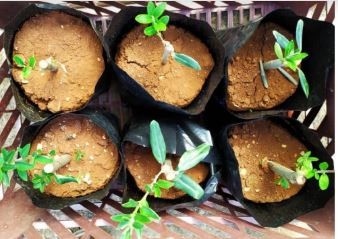Speeches Shim

With USAID support, farmers in Raqqa now have access to healthy and reliable olive seedlings to cultivate their farms.
Prior to the Syrian conflict, thousands of households in the Raqqa governorate relied on income from olive farming. Over the course of the conflict, farm conditions and capacity were severely degraded, due to farm damage and the use of olive wood for fuel. Limited access to reliable water and essential harvesting equipment led to meager harvests, leaving farm owners unable to earn sufficient incomes to provide for their families.
The recovery of Raqqa olive farms has been slow, due to a lack of support from local authorities. In order to rebuild their farms, olive farmers needed seedlings to replace trees that died or were cut down during the conflict. As there was no local source for olive seedlings, farmers purchased them from distant Syrian governorates, which was expensive and lacked consistent quality. As a result, olive farmers were often planting unknown species or diseased seedlings.
“We were facing a big problem with olive seedlings from distant regions,” said Ahmed*, an official of the Raqqa Civil Council (RCC) Agriculture and Irrigation Committee. “Transportation, customs, and other fees were a heavy burden on farmers. Purchasing seeds from unknown sources was risky. After years of cultivation and labor, we would be surprised at the types and quality of olives produced.”
In 2018, USAID’s Syria Essential Services II (SES II) program awarded three grants to Syrian organizations to assess the needs of olive farmers, provide tools to cultivate their farmlands, and support the rehabilitation of two local nurseries to provide healthy olive seedlings.
This critical support enabled local nurseries to produce olive tree seedlings. The nurseries received training on the olive growing process and increased job opportunities, especially during the harvest season. To aid olive farmers in sustaining their livelihoods, USAID provided workshops on plant protection that covered pest and disease control.
“SES II played a great role in the nursery activity by providing financial support and monitoring the work from beginning to end,” said one of the nursery owners as he reflected on the outcome of the USAID-implemented activities, “it also supported us in developing solutions to challenges along the way. We give many thanks to its efforts.”
By April 2020, each nursery had produced 65,000 seedlings with the capacity to produce 100,000 per year. This production will exceed the demand within the Raqqa governorate, meaning the nurseries will be able to meet demand for olive seedlings in other areas of Syria as well.
Over 1,500 Raqqa olive farmers now have access to locally grown, healthy olive seedlings and the skills needed to maintain their growth. This has significantly supported their sustainable growth. Without the cost of transportation and customs, olive farmers are able to hire more employees and purchase needed equipment.
“Prices for planting are getting cheaper! It may be reduced by half or even less. Olive species are also known now and the sources are reliable, they are disease-free and insect-free,” stated Zain*.
USAID continues to support economic opportunities that allow farmers to be self-reliant with the means to support their families and community for years to come.
*Pseudonym

Comment
Make a general inquiry or suggest an improvement.